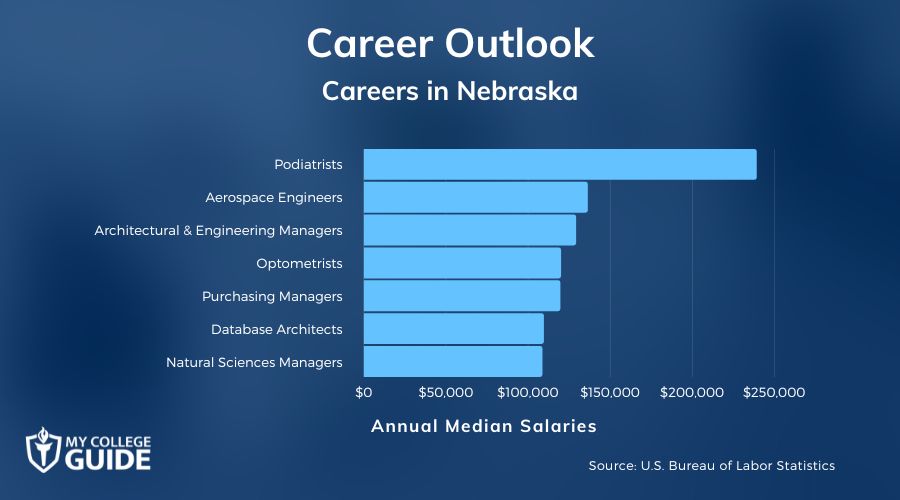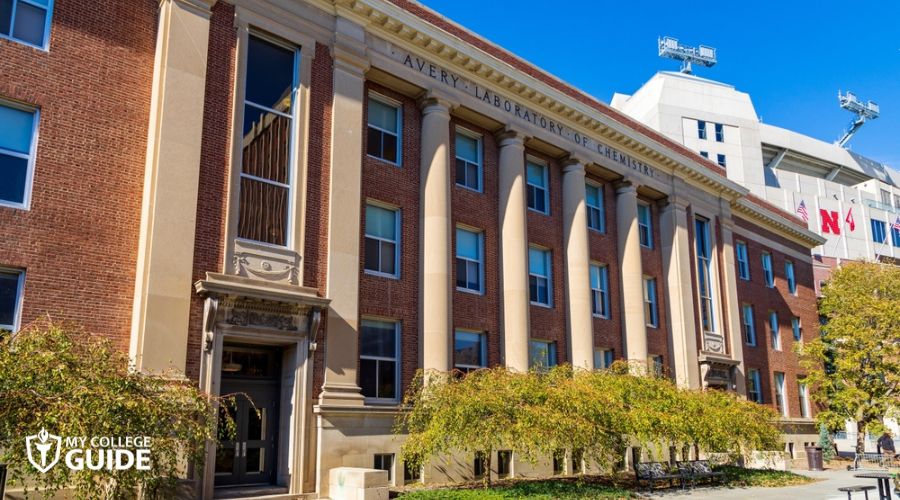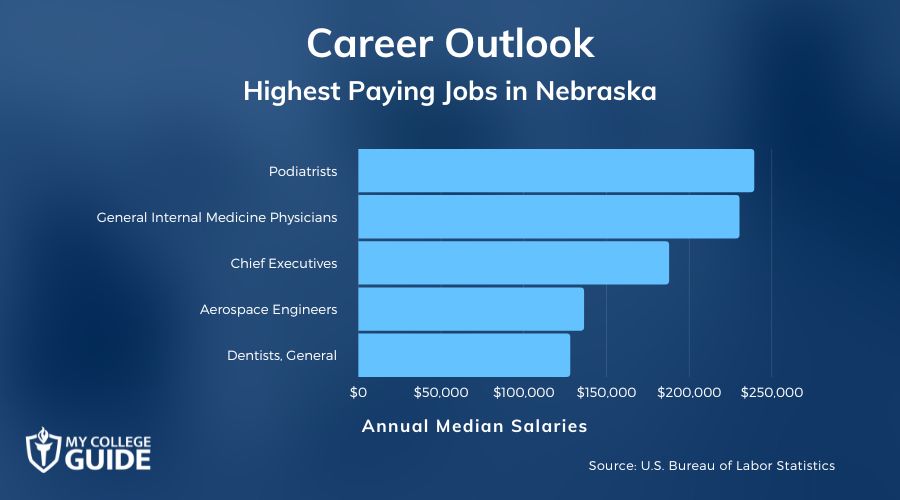The various high-quality online colleges in Nebraska demonstrate that the state is a top producer of higher education opportunities.

The state regularly ranks among the best in the nation when it comes to state and local government spending on education. They offer an impressive array of affordable institutions where students can learn online or in traditional classrooms.
Editorial Listing ShortCode:
Indeed, the Cornhusker State has demonstrated it values higher education and is dedicated to providing the best opportunities for its students.
Online Colleges in Nebraska

The National Center for Education Statistics (NCES) reports that approximately 28% of undergraduate students in Nebraska are enrolled in fully online degree programs. About another 29% are participating in hybrid programs, meaning they attend some classes online and some on campus.
These percentages continue to rise as more and more universities meet the changing needs of college students.
Some schools in Nebraska offer more than 150 online degree programs. Online universities in Nebraska aim to provide the same rigor, faculty, and support as the traditional on-campus college experience. There are also private institutions that offer more than 30 online degrees and certificates.
In Nebraska, nearly every subject matter is offered in a distance learning format, including courses requiring hands-on activities, such as biology, nursing, and mechanics. At the community college level, the largest scale category of courses is liberal arts and sciences.
Editorial Listing ShortCode:
At 4 year institutions, many online courses are offered in social sciences, business, education, health professions, and computer and information sciences.
Nebraska’s educational programs at accredited online colleges are connected through the Nebraska Distance Learning Association (NDLA). This association promotes distance learning opportunities and provides networking opportunities and resources for members.
Institutions are further supported by Network Nebraska. This educational network was created by the state to provide reliable, affordable high bandwidth connections to all of Nebraska’s community colleges and public colleges, and half of the private institutions.
The network also serves some of Nebraska’s K-12 schools and public libraries.
Common Online Degrees in Nebraska

The online schools in Nebraska offer a wide variety of majors, but these are some of the most popular in the state and what they typically entail:
- Agriculture: This major covers the science of farming and business practices in the agriculture industry. You may have the opportunity to specialize in agribusiness, animal science, food science, or plant science.
- Business Administration: This online degree teaches how to make decisions and manage teams in business settings. This major can help prepare you for various careers in consulting, entrepreneurship, finance, and other fields.
- Early Childhood Education and Training: This major is a popular choice for students who want to become kindergarten or elementary teachers. Coursework covers subjects like child development, multicultural education, and pedagogical methods.
- Emergency and Disaster Management: This major focuses on strategies to prevent and respond to emergencies, natural disasters, and other public safety issues. You may study crisis management, counterterrorism, emergency preparedness, and risk assessment.
- Healthcare Management: This online degree can help you develop healthcare knowledge and leadership skills. Coursework typically covers finance, healthcare ethics, and organizational behavior.
Graduates majoring in these areas may pursue various careers in their chosen industries.
Overview of Higher Education in Nebraska

Nebraska is home to 33 degree-granting institutions, according to the NCES. Of these, 16 are public schools, 15 are non-profit private schools, and 2 are for-profit private schools.
According to the NCES, in-state students pay on average $8,761 a year in tuition and fees to attend one of Nebraska’s 4 year public institutions. Out-of-state students pay on average $22,277. Both rates are below the national average.
Those in neighboring states may be able to get a break on their tuition, thanks to Nebraska’s partnership with the Midwest Student Exchange Program (MSEP). Through the MSEP, public universities agree to charge no more than 150% of the in-state tuition rate to qualifying students who reside in the 9 participating states.
Editorial Listing ShortCode:
In Nebraska, higher education is overseen by the Coordinating Commission for Postsecondary Education (CCPE). The CCPE’s duties include collaborating with the state’s public colleges and universities on plans to guide higher education and conducting research and publishing reports on higher education issues.
It also reviews institutions’ budget proposals and makes recommendations to state legislature, administering financial aid programs, and more.
In a recent Nebraska Higher Education Progress Report, the CCPE noted improved high school graduation rates, improved college enrollment rates, improved freshmen retention rates, and increased state-funded financial aid.
Going forward, the CCPE has stated its focus will be on making more aggressive progress, which it says is essential to the state’s economic growth.
Employment Outlook for College Graduates in Nebraska

Graduates from online schools in Nebraska have a positive employment outlook. Data from the Bureau of Labor Statistics shows that Nebraska’s unemployment rate hovers around 2.3%, which is one of the lowest rates in the country.
According to the Nebraska Department of Economic Development (DED), the state’s major industries include:
- Agriculture
- Biotechnology
- Information technology
- Transportation and logistics
Additionally, the DED states that Nebraska is home to a slightly higher-than-average number of entrepreneurs.
Graduates who want to pursue careers in Nebraska’s largest industries or start their own companies may find ample career opportunities.
Careers & Salaries in Nebraska

Nebraska has several major industries that can offer high-paying careers for qualified candidates. As you research Nebraska online degrees, you may consider these rapidly growing sectors:
- Agriculture: Farms and ranches play essential roles in Nebraska’s economy.
- Architecture and Engineering: The most popular specializations for engineers in Nebraska include civil, industrial, and mechanical engineering.
- Business: These organizations often hire professionals specializing in accounting, finance, human resources, and marketing.
- Construction: Nebraska needs skilled tradespeople like carpenters, electricians, and miners.
- Healthcare: As Nebraska’s population ages, healthcare professionals, like registered nurses and pharmacists, are in high demand.
Based on data from the Bureau of Labor Statistics, here are 10 careers in Nebraska and their annual median wages.
| Careers | Annual Median Salaries |
| Podiatrists | $239,200+ |
| Aerospace Engineers | $136,300 |
| Architectural and Engineering Managers | $129,170 |
| Optometrists | $120,020 |
| Purchasing Managers | $119,600 |
| Database Architects | $109,550 |
| Natural Sciences Managers | $108,680 |
| Software Developers | $106,720 |
| Actuaries | $105,930 |
| Compensation and Benefits Managers | $97,820 |
You may boost your earning potential by earning advanced degrees or certifications in your chosen field. Gaining work experience can also help open the door to more career opportunities, but no educational credential can guarantee a specific job or wage.
Nebraska Colleges Online Admissions Requirements

Admissions criteria can vary widely between Nebraska online colleges, but you may need to submit these common materials:
- High school and college transcripts (if applicable): These records show the classes you completed and the grades you earned.
- Resume: This document lists your educational credentials, work experience, extracurricular activities, and applicable skills.
- Letters of recommendation: Many colleges will require you to submit 2 to 3 letters of recommendation written by your teachers or work supervisors.
- ACT or SAT test scores: Only some schools require standardized test scores.
Many schools will also require you to have a minimum GPA of 2.5.
Online NE Colleges Accreditation

Many online schools in Nebraska have earned regional accreditation from professional associations. These external organizations assess schools based on criteria like curriculum, faculty-to-student ratios, and graduation rates. Colleges that meet strict quality standards for each assessment area receive accreditation.
Editorial Listing ShortCode:
Choosing a regionally accredited online school has several financial and professional advantages. Accreditation can help ensure that you receive a quality education vetted by experts in your industry.
Potential employers may view your applications more favorably if you have graduated from an accredited program. Additionally, the federal government only gives financial aid, like grants and student loans, to students at regionally accredited institutions.
Financial Aid and Scholarships

If you’re interested in pursuing higher education at a Nebraska online university, a common place to start is to complete the Free Application for Federal Student Aid (FAFSA). This will be used to determine your access to federal, state, and even some forms of private financial aid.
Other types of aid include grants and scholarships. These are often ideal types of financial assistance since they do not have to be paid back as long as they are used appropriately.
In addition to federal grants, the state of Nebraska, through the Coordinating Commission for Postsecondary Education, offers qualifying residents the following grant and scholarship programs:
- Access College Early (ACE) Scholarship Program: This program pays tuition and fees for qualifying low-income high school students to enroll in college courses through dual enrollment or early enrollment agreements.
- Nebraska Opportunity Grant (NOG): This grant offers need-based aid
- Community College Gap Assistance: This program provides need-based aid for qualifying community college students who are taking credit or non-credit courses that could lead to jobs in high-need fields.
Nebraska also has a variety of private scholarships available, which may be awarded based on academic or athletic skill, financial need, field of study, or even hobbies and interests.
Here are some scholarships available that those hoping to attend one of the many Nebraska colleges and universities online may apply to:
- Lawrence ‘Larry’ Frazier Memorial Scholarship: $800
- Scott Mecham BBB Student of Integrity Award: $2,000
- Susan T. Buffett Foundation Scholarship: Varies
- Urban League of Nebraska Scholarship: Undisclosed
- Norma Ross Walter Scholarship:
- 1st place: $2,500
- 2nd place: $1,750
- 3rd place: $1,250
It can also be a good idea to ask the financial aid office at the school you have chosen, as they may have aid programs available exclusively to those who are admitted.
Nebraska Online Education Resources

Government agencies and nonprofit organizations in Nebraska have created several resources to help students, including:
- Council of Independent Nebraska Colleges Foundation: This website offers information about the council’s 13 member institutions and financial aid resources.
- Nebraska Community College Association: This organization catalogs degrees offered at community colleges across Nebraska and provides peer comparison data to help you choose between schools.
- Nebraska’s Coordinating Commission for Postsecondary Education: This association offers several financial aid opportunities for college students and helps develop Nebraska’s educational policies.
You can consider using these free resources to gather information as you research Nebraska online colleges.
How Much Does It Cost to Go to a Nebraska University Online?

Several factors affect tuition costs for online schools in Nebraska. Typically, in-state students pay lower tuition and fees than out-of-state students. Also, public universities that receive government funding usually charge less than private institutions.
According to the National Center for Education Statistics, here are the average tuition and required fees for colleges in Nebraska:
- Public 4 year institutions: $8,761 for in-state students and $22,277 for out-of-state students
- Private 4 year institutions: $24,985 for all students
- Public 2 year institutions: $3,179 for in-state students and $3,956 for out-of-state students
You may qualify for financial aid that can reduce your upfront expenses.
Tuition Breaks for Out-of-State Students

Many Nebraska online universities offer desirable programs that attract students from across the United States. If you’re an out-of-state resident, you may qualify for reduced tuition through state reciprocity programs.
State reciprocity is an agreement between two or more states in the same geographic region. These states agree to give tuition breaks to qualifying out-of-state students.
Nebraska participates in the Midwest Student Exchange Program (MSEP). This program allows eligible out-of-state students to attend Nebraska online universities at discounted tuition rates.
Editorial Listing ShortCode:
To qualify, you must live in Indiana, Kansas, Minnesota, Missouri, Ohio, or Wisconsin and enroll in a participating Nebraska college. According to the MSEP, qualifying students save an average of $7,000 yearly.
What Jobs Are in High Demand in Nebraska?

While Nebraska is home to many thriving industries, several careers are in exceptionally high demand.
According to NEworks, the official Nebraska government website, these are five fast-growing industries in Nebraska and their projected change over the next 10 years:
- Food Preparation and Serving Related: 19.75%
- Personal Care and Service: 15.33%
- Computer and Mathematical: 13.68%
- Healthcare Support: 13.29%
- Legal: 10.79%
Choosing a career in one of these areas may increase your chances of having plentiful job opportunities after you complete your degree.
What Are the Highest Paying Jobs in Nebraska?

Many students consider their earning potential when choosing Nebraska online degrees. Data from the Bureau of Labor Statistics identifies these as some of the highest-paying careers in Nebraska:
- Podiatrists: $239,200+
- General Internal Medicine Physicians: $230,280
- Chief Executives: $187,720
- Aerospace Engineers: $136,300
- Dentists, General: $127,940
The most lucrative jobs often require advanced degrees. For instance, podiatrists must earn a Doctor of Podiatric Medicine, finish a 3 year residency, and pass a state licensing exam. Similarly, chief executives often hold a master’s degree in business administration.
Many factors can affect career and salary outcomes, like geographic area and work experience.
List of Online Colleges in Nebraska
Methodology: The following school list is in alphabetical order. To be included, a college or university must be regionally accredited and offer degree programs online or in a hybrid format.

Bellevue University offers more than 40 online bachelor’s degree programs. Fields of study offered include marketing, business management and leadership, computer information systems, sustainability management, web development, and more.
Classes are limited to 24 students. Some of Bellevue’s online programs offer the option of learning with a cohort.
Bellevue University is accredited by the Higher Learning Commission.

Bryan College of Health Sciences offers an online nursing program. Students are typically expected to come to campus three or four times each semester, but can otherwise complete their coursework according to their own schedule.
The school’s online courses are taught by instructors who receive special training in distance education.
Bryan College of Health Sciences is accredited by the Higher Learning Commission.

Chadron State College offers several online bachelor’s degree programs. Fields of study include education, geoscience, applied sciences, family and consumer sciences, interdisciplinary studies, psychological sciences, mathematics, and business.
The school’s online courses use an accelerated, 8 week format. Some programs may require virtual meetings or a limited number of face-to-face activities.
Chadron State College is accredited by the Higher Learning Commission.

Most students at Clarkson College do at least some of their learning online, with more than 90% taking at least one online course each semester. The student-to-faculty ratio at Clarkson is just 25-to-1 to help ensure that students can receive personalized attention.
Possible majors include healthcare business management, RN-to-BSN, and psychology.
Clarkson College is accredited by the Higher Learning Commission.

The College of Saint Mary offers online degree programs in education and organizational leadership and a post-baccalaureate certificate in paralegal studies. The College of Saint Mary is an all-women’s, Catholic college that is dedicated to helping students grow spiritually in addition to furthering their careers.
The College of Saint Mary is accredited by the Higher Learning Commission.

Concordia University—Nebraska offers faith-based online degree programs in fields such as early childhood education, healthcare administration, and business administration. Courses are self-paced and have multiple start dates every year.
The programs are designed to teach theoretical and practical knowledge.
Concordia University – Nebraska is accredited by the Higher Learning Commission.

Creighton University offers online degree programs in business, health, health sciences, nursing, ministry, leadership, and education. The programs are designed to help working professionals fit school into their busy schedules.
The school’s instructors are engaged with online students, and students have access to the career center, networking opportunities, and other support services.
Creighton University is accredited by the Higher Learning Commission of the North Central Association of Colleges and Schools.

Doane University has a 100% online Open Learning Academy. The academy offers an undergraduate certificate program in principles of agribusiness and numerous online courses that can be taken while earning a degree on campus.
Online courses at Doane are academically rigorous. Some are only 8 weeks long, while others are a traditional 16 weeks long.
Doane University is accredited by the Higher Learning Commission.

Midland University aims to provide flexibility for its students by offering classes online and at two different campus locations. Students in the program can enjoy small class sizes and engaging instructors.
The school offers 33 different majors, including financial services, history, exercise science, RN-to-BSN, accounting, and business intelligence and technology.
Midland University is accredited by the Higher Learning Commission.

Nebraska Methodist College is a specialized nursing and allied health college with online and hybrid degree programs. Fields of study offered include cardiovascular sonography, healthcare management, imaging sciences, multispecialty sonography, respiratory therapy, and nursing.
Online courses can vary in length, depending on the program. The student-to-faculty ratio is just 14-to-1. The school offers students many service-learning opportunities.
Nebraska Methodist College is accredited by the Higher Learning Commission.

Nebraska Wesleyan University is a Methodist school that offers classes both online and on campus. Possible undergraduate majors include business administration, data analytics, accounting, communication studies, digital marketing, and psychology.
Nebraska Wesleyan emphasizes experiential learning through internships, research, study abroad, and service-learning opportunities.
Nebraska Wesleyan University is accredited by the Higher Learning Commission.

Peru State College offers online undergraduate degree programs in psychology, criminal justice, and business administration. The business administration degree program comes with numerous specialization options, including finance, accounting, and marketing.
An average class has fewer than 25 students, and classes are designed to help students develop relationships with their teachers and classmates.
Peru State College is accredited by the Higher Learning Commission.

The University of Nebraska—Kearney offers more than 50 online programs. These include bachelor’s degrees in business administration, communication studies, history, criminal justice, social work, and applied health sciences.
UNK’s online courses include discussion forums and are highly interactive. They are as academically rigorous as on-campus courses.
The University of Nebraska – Kearney is accredited by the Higher Learning Commission.

The University of Nebraska—Lincoln offers online programs for a Bachelor of Applied Science and a Bachelor of Science in Early Childhood Education in a Mobile Society. These are degree completion programs for those who already have some college credits.
Online courses are taught by the same instructors who teach on campus.
The University of Nebraska – Lincoln is accredited by the Higher Learning Commission.

The University of Nebraska—Medical Center offers self-paced distance learning programs for working medical professionals.
It offers a Bachelor of Science in Medical Laboratory Science and a Bachelor of Science in Medical Imaging and Therapeutic Sciences. It also offers a Master of Perfusion Studies and a Master of Physician Assistant Studies.
University of Nebraska – Medical Center is accredited by the Higher Learning Commission.

The online degree programs at the University of Nebraska—Omaha are designed to provide convenience and flexibility, while also still being academically rigorous and engaging. All classes are taught by the same instructors who teach on campus.
Bachelor’s degree options include studies in business administration, management information systems, criminology and criminal justice, political science, and more.
The University of Nebraska – Omaha is accredited by the Higher Learning Commission.

At Wayne State College, students can earn a BA or BS in Business Management, Criminal Justice, or Human Resource Management online. The online courses are flexible but are designed to provide the same education students can receive on campus.
Wayne State has a generous transfer credit policy, accepting up to 90 qualifying credits from other accredited institutions.
Wayne State College is accredited by the Higher Learning Commission.

York University offers fully online, Christ-centered degree programs in psychology, business, education, organizational leadership, and general studies.
There are no set log-in times, and most courses use free open educational resources so students don’t have to pay for textbooks. York has a student-to-faculty ratio of just 14-to-1.
York University is accredited by the Middle States Commission on Higher Education.
Getting Your Online Degree in Nebraska

The Cornhusker State has a lot to offer. With top-notch colleges and universities, an impressive list of online learning opportunities, and very affordable tuition rates, Nebraska is an excellent place to pursue postsecondary education for many.
You can get started today by researching accredited NE online colleges that offer your chosen degree program.
You can also view our Online Colleges in Montana and Online Colleges in Nevada guides for more options.
